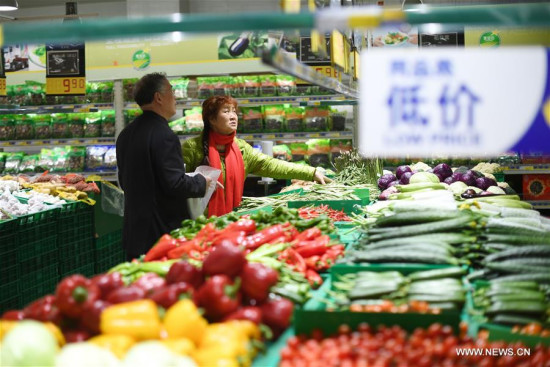
Consumers select vegetables at a supermarket in Wuhan, capital of central China's Hubei Province, March 9, 2017. (Xinhua/Xiong Qi)
China's inflation held steady in April, reinforcing views about stabilization in the economy and giving policy makers more leeway to tighten regulation.
The consumer price index (CPI) rose 1.2 percent year on year in April, against 0.9 in March, as higher non-food prices outweighed continued declines in food prices, data from the National Bureau of Statistics (NBS) showed Wednesday.
The growth remains below the government's annual target of around 3 percent set for 2017.
Producer price index (PPI), which measures costs of goods at the factory gate, rose 6.4 percent year on year in April, down from 7.6 percent in March. On a monthly basis, the PPI fell 0.4 percent, the first month-on-month decline since July last year.
Falling commodity prices are the main drag on gains in PPI, but reasonable demand, further moves against excess capacity and a weaker yuan, prevent a sharper slide, Bloomberg economist Tom Orlik said.
Orlik expects CPI to rise in the months ahead, but not high enough to shift the central bank off its cautious, incrementally tightening path.
Deng Haiqing, chief economist with JZ Securities, said the mild CPI growth and PPI's pull-back in April will give policy makers more scope to contain debt and financial risk.
With the economy doing reasonably well, policy has shifted to deleveraging and risk control, but Deng warned that over-tightening could destabilizing growth.
As part of the effort, China has shifted away from a relatively loose monetary policy that helped lift growth over the past years, gradually guided interbank lending rates higher and tightened supervision on non-performing assets, shadow banking and local government financing.
These measures might be positive for the long-term health of the financial system and the economy but may lead to weaker fixed asset investment and economic activity, UBS economist Wang Tao said.
Concern over the regulatory squeeze has weighed on the stock markets, with the benchmark Shanghai Composite Index shedding more than 6 percent during the past month.
Ren Zeping, chief economist at Founder Securities, said while the regulatory squeeze will continue in the short term,the government must balance the frequency and intensity of policies to deleverage, manage liquidity and stabilize growth.
China's GDP grew 6.9 percent in the Q1.


















































